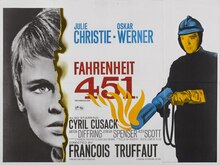Fahrenheit 451 (film)
| Fahrenheit 451 | |
|---|---|

Theatrical release poster
|
|
| Directed by | François Truffaut |
| Produced by | Lewis M. Allen |
| Screenplay by |
|
| Based on |
Fahrenheit 451 by Ray Bradbury |
| Starring | |
| Music by | Bernard Herrmann |
| Cinematography | Nicolas Roeg |
| Edited by | Thom Noble |
|
Production
company |
|
| Distributed by | Universal Pictures |
|
Release date
|
|
|
Running time
|
112 minutes |
| Country | United Kingdom United States France |
| Language | English |
| Budget | $1.5 million |
| Box office | $1,000,000 (US/ Canada) 779, 811 admissions (France) |
Fahrenheit 451 is a 1966 British Dystopian science fiction drama film directed by François Truffaut and starring Oskar Werner, Julie Christie, and Cyril Cusack. Based on the 1953 novel of the same name by Ray Bradbury, the film takes place in a controlled society in an oppressive future in which a fireman, whose duty it is to burn all literature, becomes a fugitive for reading. This was Truffaut's first colour film as well as his only English-language film. At the 1966 Venice Film Festival, Fahrenheit 451 was nominated for the Golden Lion.
In the future, a totalitarian government employs a force known as Firemen to seek out and destroy all literature, permitting them to search anyone, anywhere, at any time. One of the Firemen, Guy Montag (Oskar Werner), meets one of his neighbors, Clarisse (Julie Christie), a 20-year-old schoolteacher whose job is hanging by a thread due to her unorthodox views. The two have a discussion about his job, where she asks if he ever reads the books he burns. Curious, he begins to hide books in his house and read them, starting with Charles Dickens' David Copperfield. This leads to conflict with his wife, Linda (also played by Julie Christie), who is more concerned with being popular enough to be a member of The Family, an interactive television program that refers to its viewers as cousins.
At the house of a book collector, the captain (Cyril Cusack) talks with Montag at length about how books change people and make them want to be better than others, which is considered anti-social. The book collector, a middle-aged woman who was seen with Clarisse a few times during Montag's rides to and from work, refuses to leave her house, opting instead to burn herself and the house so she can die with her books. Returning home that day, Montag tries to tell Linda and her friends about the woman who martyred herself in the name of books and confronts them about knowing anything about what's going on in the world, calling them zombies and telling them they're just killing time instead of living life. Disturbed over Montag's behavior, Linda's friends try to leave but Montag stops them, by forcing them to sit and listen to a novel passage. During the reading, one of Linda's friends breaks down crying, aware of the feelings she repressed over the years, while Linda's other friends leave in disgust over Montag's alleged cruelty and the sick content of the novel. That night, Montag dreams of Clarisse as the book collector who killed herself. The same night, Clarisse's house is raided but she escapes through a trapdoor in the roof, thanks to her uncle. Montag breaks into the captain's office looking for information about the missing Clarisse and is caught but not punished.
...
Wikipedia
